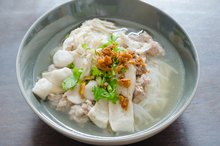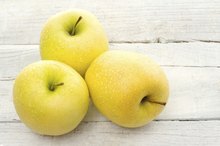Fried Mushrooms Nutritional Values
Mushrooms are the fruiting body of a fungus, and they often are edible. They are a common ingredient in soups and salads, and you also can serve them as a side dish. The nutritional value of fried mushrooms depends on the type and the amount of oil you use during the frying process.
Preparation and Serving Size
NutritionData.com provides nutritional information for white mushrooms, one of the most common types available commercially in the United States 1. The mushrooms are stir-fried, and the serving size is one cup of sliced mushrooms weighing 108 grams, or about 4 ounces.
Calories
Acorn Squash Nutrition Information
Learn More
A serving of fried mushrooms has 28 calories 2. Carbohydrates contribute 15 calories, proteins provide 10 calories, and fat accounts for 3 calories . A serving of fried mushrooms provides slightly more than 1 percent of an adult's daily value (DV) for calories, based on a daily diet of 2,000 calories 2.
Carbohydrates
A serving of fried mushrooms has 4.4 grams of carbohydrates, or about 1 percent of the DV. This includes 2 grams of dietary fiber, which is about 8 percent of the DV. A serving of fried mushrooms doesn’t contain any simple sugar.
Fat and Protein
Nutritional Value of Sauteed Mushrooms
Learn More
A serving of fried mushrooms has 0.4 grams of total fat, which is less than 1 percent of the DV. Fried mushrooms have no saturated fat, trans fat or cholesterol. A serving of fried mushrooms also has 3.9 grams of protein, which is about 8 percent of the DV.
Vitamins and Minerals
A serving of fried mushrooms has 29 percent of the DV for riboflavin, 22 percent of the DV for niacin and 16 percent of the DV for pantothenic acid. Fried mushrooms are a good source of selenium, and a serving provides 21 percent of the DV. Fried mushrooms also provide 16 percent of the DV for copper, 12 percent of the DV for potassium and 11 percent of the DV for phosphorus.
Related Articles
References
- NutritionData: Nutrition Facts and Analysis for Stir-Fried White Mushrooms
- myfitnesspal: Calories in My Homemade Fried Mushrooms
- Fun with funghi: Garnish your meals with mushrooms. Academy of Nutrition and Dietetics. Updated January 17, 2019.
- Mushrooms, raw. FoodData Central. U.S. Department of Agriculture. Published April 1, 2019.
- Nakashima A, Yamada K, Iwata O, et al. β-Glucan in foods and its physiological functions. J Nutr Sci Vitaminol. 2018;64(1):8-17. doi:10.3177/jnsv.64.8
- Lo HC, Wasser SP. Medicinal mushrooms for glycemic control in diabetes mellitus: History, current status, future perspectives, and unsolved problems (review). Int J Med Mushrooms. 2011;13(5):401-26. doi:10.1615/IntJMedMushr.v13.i5.10
- Institute of Medicine (US) Panel on Micronutrients. Dietary Reference Intakes for vitamin A, vitamin K, arsenic, boron, chromium, copper, iodine, iron, manganese, molybdenum, nickel, silicon, vanadium, and zinc. Washington (DC): National Academies Press (US); 2001.
- Potassium. Fact Sheet for Professionals. National Institutes of Health Office of Dietary Supplements. Updated March 2, 2020
- Iron. Fact Sheet for Professionals. National Institutes of Health Office of Dietary Supplements. Updated December 19, 2019
- Wasser SP. Medicinal mushroom science: History, current status, future trends, and unsolved problems. Int J Med Mushrooms. 2010;12(1):1-16. doi:10.1615/IntJMedMushr.v12.i1.10
- Chaturvedi VK, Agarwal S, Gupta KK, Ramteke PW, Singh MP. Medicinal mushroom: Boon for therapeutic applications. 3 Biotech. 2018;8(8):334. doi:10.1007/s13205-018-1358-0
- Cheung PCK. The nutritional and health benefits of mushrooms. Nutr Bull. 2010;35(4):292-299. doi:10.1111/j.1467-3010.2010.01859.x
- Kalaras MD, Richie JP, Calcagnotto A, Beelman RB. Mushrooms: A rich source of the antioxidants ergothioneine and glutathione. Food Chem. 2017;233:429-433. doi:10.1016/j.foodchem.2017.04.109
- Feng L, Cheah IK, Ng MM, et al. The association between mushroom consumption and mild cognitive impairment: A community-based cross-sectional study in Singapore. J Alzheimers Dis. 2019;68(1):197-203. doi:10.3233/jad-180959
- Vitamin D. Fact Sheet for Professionals. National Institutes of Health Office of Dietary Supplements. Updated March 24, 2020
- Keegan RJ, Lu Z, Bogusz JM, Williams JE, Holick MF. Photobiology of vitamin D in mushrooms and its bioavailability in humans. Dermatoendocrinol. 2013;5(1):165-76. doi:10.4161/derm.23321
- McRae MP. Dietary fiber intake and type 2 diabetes mellitus: An umbrella review of meta-analyses. J Chiropr Med. 2018;17(1):44-53. doi:10.1016/j.jcm.2017.11.002
- Ferreira H, Alves M, Pineda F et al. Cross-reactivity between molds and mushrooms. Pediatr Allergy Immunol and Pulmonol. 2017;30(2):126-128. doi:10.1089/ped.2017.0746
- North American Mycological Association. Mushroom poisoning syndromes.
- Nardozzi, C. The National Gardening Association. Learning Library. Edible Landscaping - Edible of the Month: Two Simple, Beginner Mushrooms.
- Mushrooms, canned. FoodData Central. U.S. Department of Agriculture. Published April 1, 2019.
Writer Bio
Allan Robinson has written numerous articles for various health and fitness sites. Robinson also has 15 years of experience as a software engineer and has extensive accreditation in software engineering. He holds a bachelor's degree with majors in biology and mathematics.









